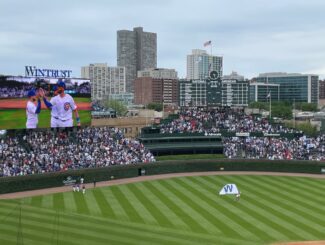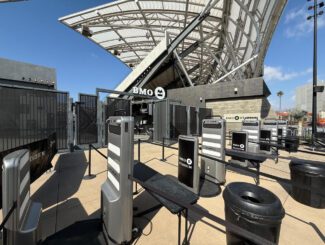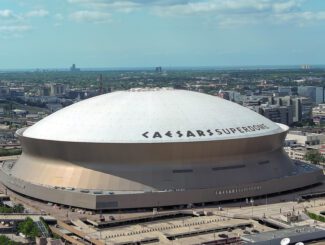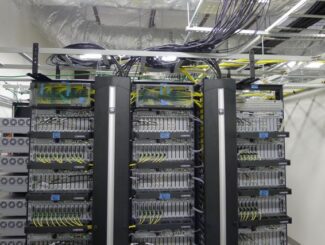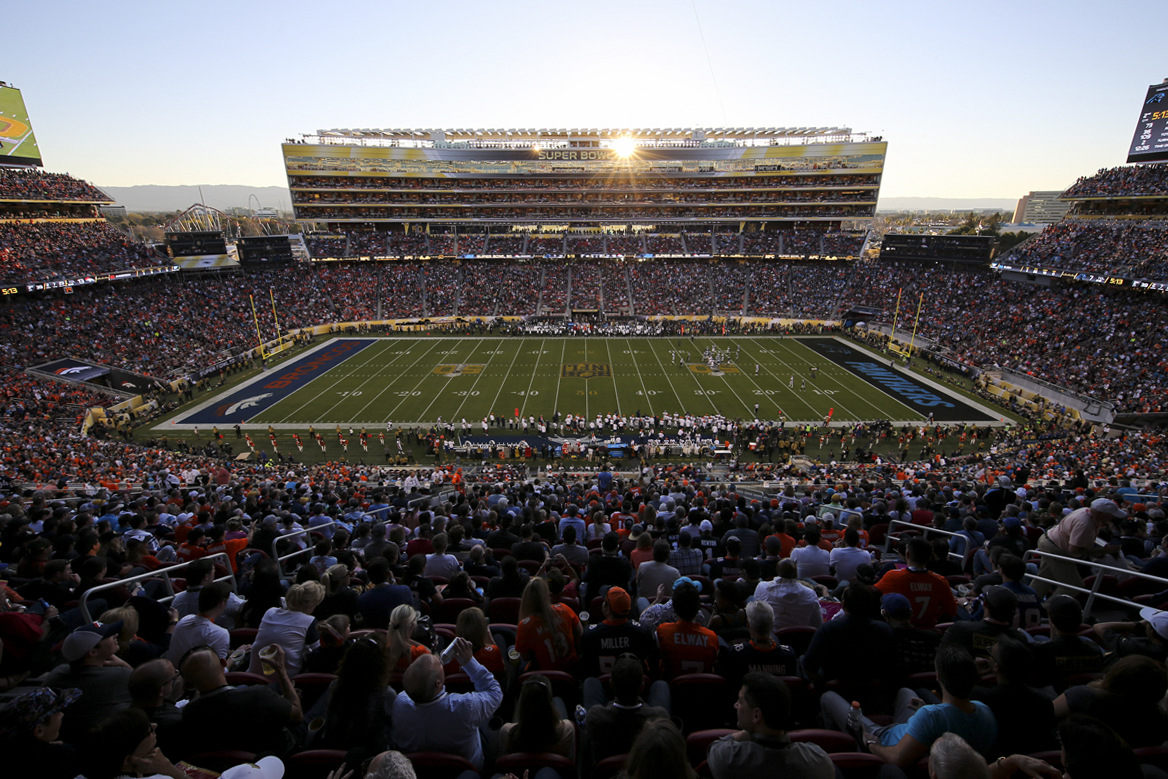
Ten years after opening as the first-ever stadium built expressly with fan-facing technology in mind, the San Francisco 49ers’ Levi’s Stadium announced a list of technology improvements meant to keep the venue at the forefront of the connected- and intelligent-stadium world.
One of the biggest parts of the project is a full network upgrade, with a new Cisco hyperconverged core network and a Cisco Wi-Fi 6 network replacing the siloed network and Aruba Wi-Fi gear used when the Santa Clara, Calif.-located venue opened in 2014.
The new Wi-Fi network, which was actually operational last year, will be joined by a full redesign of the neutral-host celluar distributed antenna system (DAS). Additional improvements will be made to existing videoboard and ribbon-light deployments, as well as in areas including the stadium app and concessions technology, according to the team.
The technology enhancements are part of a overall $200 million stadium-improvement package that the team will fully deploy before the stadium hosts the NFL’s Super Bowl LX as well as World Cup soccer games in 2026. Other parts of the upgrade plan include new and expanded premium seating areas and suite remodels, according to the press release.
Costa Kladianos, executive vice president and head of technology for the San Francisco 49ers, said the networking and other technology improvements are part of a mission to take Levi’s Stadium from its origin as “the most connected stadium” to a place where the venue might be known as “an intelligent stadium” that focuses on using technology to improve the fan experience.
“It’s all about the fan,” said Kladianos, who joined the Niners in his current role just before the 2022 football season.
Converged core network and Wi-Fi 6
Perhaps one of the biggest and most important changes to the building’s technical infrastructure was a conversion of the stadium’s core network — previously a group of “silo” networks each supporting a different application — into a hyperconverged single network. Using core network gear from Cisco, master technology integrator AmpThink collapsed the stadium’s previous network architecture into a single IP network, a move that allows for easier administration and drastically reduced costs for equipment.
The proof of the model’s efficiency and power came when SoFi Stadium hosted Super Bowl 56 in 2022, a day when a stunning 53 petabytes of traffic was carried on the converged network. SoFi Stadium executives praised the converged network for its ability to cut costs and make administration easier, without any sacrifices to throughput or capacity.
Other new-build stadiums that have hired AmpThink to deliver a converged core network include the just-opened Intuit Dome in Inglewood, Calif., Allegiant Stadium in Las Vegas, Nev., and CityPark in St. Louis. AmpThink has also brought converged-network retrofits to SAP Center in San Jose, Calif., and Kia Center in Orlando, Fla.
“Our partner AmpThink is just a group of brilliant people,” Kladianos said. “I’m always confident in what they do in network design and deployment.”
That includes the new 1,300-AP Wi-Fi 6 network, which replaced the original Wi-Fi network that used gear from Aruba, a Hewlett-Packard Enterprise company. The stadium’s opening design, the first to use under-seat AP deployment in a planned build, started with 680 APs. The new network, Kladianos said, includes more AP deployments to provide coverage in previously hard-to-cover areas, including spots outside the stadium walls. The current design uses a mix of under-seat and overhead AP placements, Kladianos said.
The Wi-Fi 6 network, actually deployed in 2023, stood up to the entertainment world’s biggest current bandwidth test, that being Taylor Swift’s Eras Tour shows. Levi’s Stadium, which hosted the Swift tour at the end of July 2023, saw traffic numbers of approximately 9 Gbps throughput and total single-show data numbers of about 32 terabytes, Kladianos said. But the improved capacity and throughput characteristics of the relatively new Wi-Fi 6 standard held up to the challenge, Kladianos said.
“When she came on the stage at 8:10 p.m., we could see a huge network spike,” Kladianos said of Swift. “But we had no capacity issues. We passed the biggest test.”
DAS, video improvements coming for Super Bowl, World Cup
Also in the works is a planned upgrade for the stadium’s cellular wireless DAS, a neutral-host deployment owned by the Niners. Former designer DAS Group Professionals, now a part of America Fujikura Ltd. (AFL) after an acquisition earlier this year, will lead the upgrade, Kladianos said.
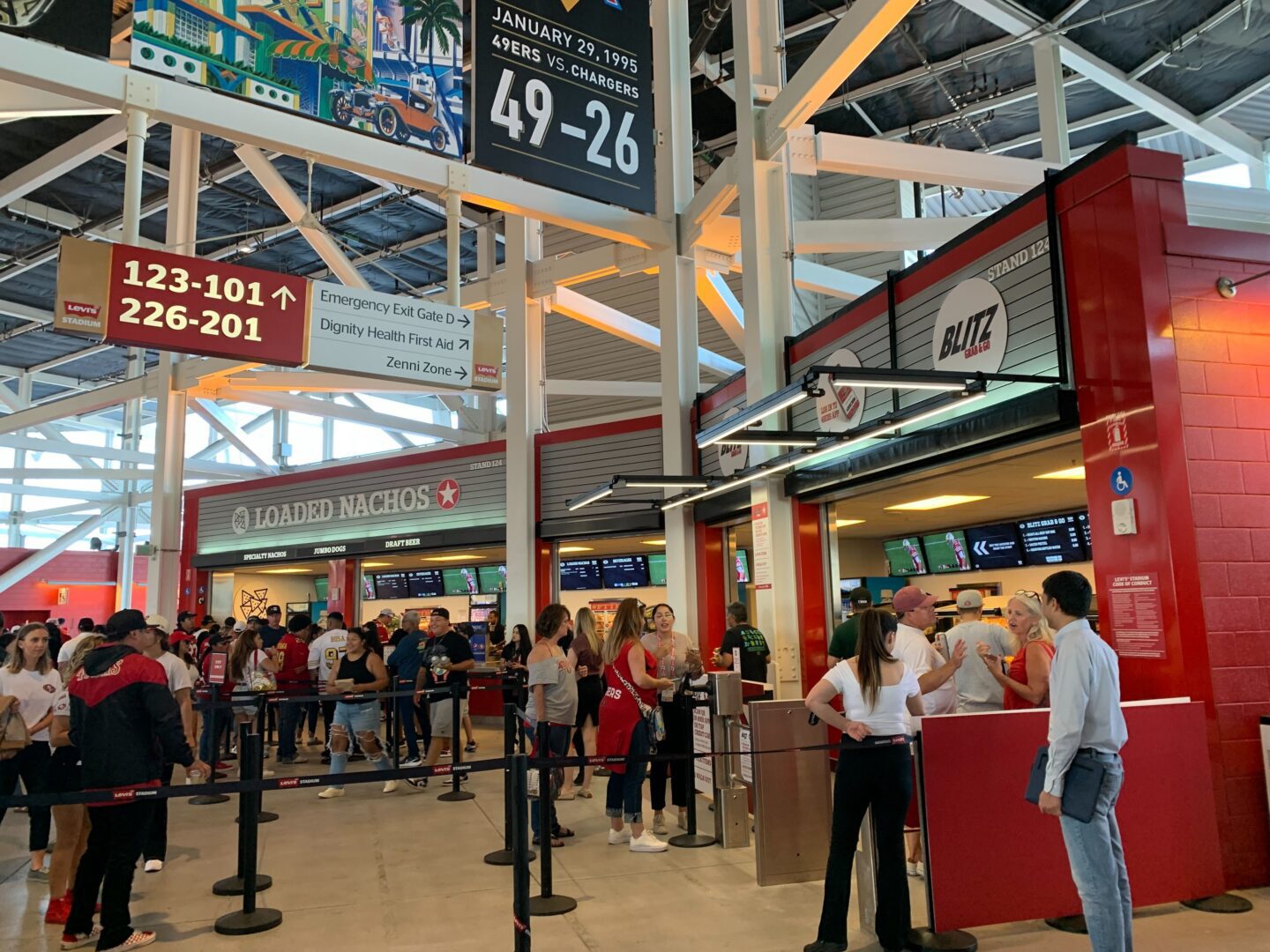
“They know the building,” Kladianos said of the DGP team, which is now part of AFL’s stadium DAS business. The core DAS hardware from JMA, Kladianos said, is still going strong — “never had an issue with it,” he said. The new DAS, Kladianos said, will add in C-band and millimeter wave coverage per the carrier demands.
Also ahead of the 2025 NFL season, the Niners plan to install new “state-of- the-art” video boards, which will give Levi’s Stadium the largest 4K display in the league, according to the team. The Niners will also upgrade more than 13,000 square feet of LED screens, while also adding a new LED field lighting system to brighten the playing surface for night games while also conserving energy.
Getting feedback from the checkout-free concession stands
Kladianos said the Niners will also be tracking their current checkout-free concession stands to see if their performance warrants an expansion of the technology’s use. Using technology from Zippin, the current market leader in the stadium-specific checkout-free market, the Niners currently have two “Blitz Bars” that use checkout-free technology — one a drink lane configuration, the other a version of Zippin’s “Walk-up” format, which uses existing concession stand infrastructure with checkout-free technology wrapped around the outside.
Also on his see-how-it-works tech radar is the use of facial authentication technology for tickets, a system currently gaining footholds across the sports world. The just-opened Intuit Dome went all-in on the technology, using it for both ticketing verification as well as concessions purchases. Other teams like the Cleveland Browns have been using technology from a startup called Wicket for both ticketing and concessions. And this year every NFL team, including the Niners, will be using Wicket-based facial authentication systems for internal credentialing for staff, field and player access. Kladianos said he would track the effectiveness of the internal facial-authentication systems as a way to inform himself about how it might work in a fan-facing manner.



